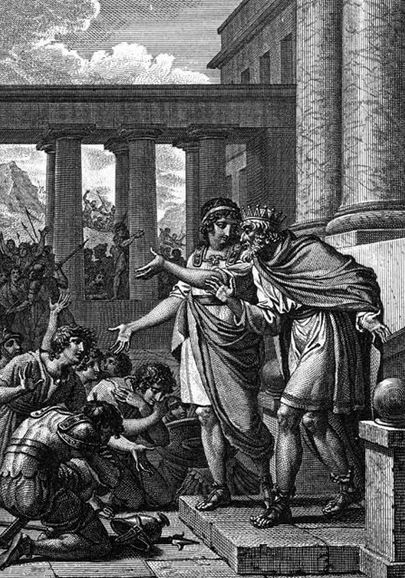In Greek mythology, Aeacus is a prominent figure known for his crucial role in the afterlife. As one of the three judges of the underworld, Aeacus holds a significant position in the mythological realm, where he oversees the souls of the deceased. His primary responsibility is to ensure that justice is served in the afterlife, particularly for those from his homeland of Aegina. This blog will delve into the details of where Aeacus is situated in the underworld and explore his importance and duties within this realm.
Section 1: Who is Aeacus?
Background and Origins
Aeacus, a revered figure in Greek mythology, was originally a king of the island of Aegina. Renowned for his piety and fairness, Aeacus was celebrated for his just rule and commitment to righteousness. His exemplary qualities during his life earned him a distinguished place in mythological traditions. He was seen not just as a monarch but as a symbol of moral integrity and judicial fairness.
Transition to the Underworld
After his death, Aeacus’s esteemed reputation continued in the afterlife. The gods, recognizing his unparalleled sense of justice, appointed him as one of the three judges of the underworld. This transition marked a significant shift from his earthly reign to a celestial role where he would judge the souls of the deceased. Alongside Minos and Rhadamanthus, Aeacus was entrusted with the vital task of overseeing the moral and ethical judgments of the souls who entered the underworld, ensuring that each soul received appropriate retribution or reward based on their earthly deeds.

Section 2: Aeacus’s Role in the Underworld
The Judges of the Underworld
In Greek mythology, the underworld is overseen by three distinguished judges: Aeacus, Minos, and Rhadamanthus. Each of these figures plays a critical role in the judgment of souls, ensuring that the moral and ethical actions of individuals during their earthly lives are accounted for in the afterlife.
- Minos: Often depicted as the chief judge, Minos is known for his role in determining the final destination of souls. He is associated with the concept of divine justice and is said to possess a stern and authoritative demeanor.
- Rhadamanthus: The second judge, Rhadamanthus, is renowned for his strictness and fairness. He is responsible for assessing the lives of souls from regions outside of Crete and is known for his emphasis on truth and integrity.
- Aeacus: The third judge, Aeacus, shares in the responsibility of adjudicating souls but is particularly associated with those from his homeland of Aegina. Together, these three judges ensure a balanced and fair evaluation of the souls that enter the underworld.
Aeacus’s Specific Duties
Aeacus’s role in the underworld is distinctive due to his focus on the souls of the deceased from Aegina. His primary duty is to judge these souls, a responsibility that underscores his strong connection to his homeland. Aeacus’s reputation for justice and fairness is well-established in mythological texts, and his role reflects his life’s dedication to these principles. The gods honored him with this task, confident in his ability to maintain moral integrity and fairness in the afterlife.
Section 3: Location in the Underworld
The Tribunal of the Dead
The tribunal where souls are judged in the underworld is often referred to as the “Hall of Judgment.” This area is a significant part of the underworld where the three judges convene to evaluate the deeds of the deceased. The Hall of Judgment serves as the central location for determining the fate of souls, with each judge contributing their expertise to the process.
Aeacus’s Position
Within the underworld, Aeacus is situated in a prominent position associated with the judgment of souls from Aegina. His specific role within the Hall of Judgment highlights his importance and expertise in overseeing these particular souls. Aeacus’s location reflects his crucial function in the judicial process, ensuring that the souls from his homeland receive fair and just treatment based on their earthly actions. His position not only underscores his role as a judge but also connects him deeply to his origins and the values he upheld during his life.Section 2: Aeacus’s Role in the Underworld
The Judges of the Underworld
In Greek mythology, the underworld is overseen by three distinguished judges: Aeacus, Minos, and Rhadamanthus. Each of these figures plays a critical role in the judgment of souls, ensuring that the moral and ethical actions of individuals during their earthly lives are accounted for in the afterlife.
- Minos: Often depicted as the chief judge, Minos is known for his role in determining the final destination of souls. He is associated with the concept of divine justice and is said to possess a stern and authoritative demeanor.
- Rhadamanthus: The second judge, Rhadamanthus, is renowned for his strictness and fairness. He is responsible for assessing the lives of souls from regions outside of Crete and is known for his emphasis on truth and integrity.
- Aeacus: The third judge, Aeacus, shares in the responsibility of adjudicating souls but is particularly associated with those from his homeland of Aegina. Together, these three judges ensure a balanced and fair evaluation of the souls that enter the underworld.
Aeacus’s Specific Duties
Aeacus’s role in the underworld is distinctive due to his focus on the souls of the deceased from Aegina. His primary duty is to judge these souls, a responsibility that underscores his strong connection to his homeland. Aeacus’s reputation for justice and fairness is well-established in mythological texts, and his role reflects his life’s dedication to these principles. The gods honored him with this task, confident in his ability to maintain moral integrity and fairness in the afterlife.

Section 4: Mythological Context
Sources of Mythological Information
Aeacus is a well-documented figure in Greek mythology, appearing in several key sources:
- Homer’s “Odyssey”: Aeacus is briefly mentioned in this epic as part of the narrative of the underworld. His role as one of the judges of the dead is touched upon, providing a glimpse into his position and duties in the afterlife.
- Hesiod’s “Theogony”: This work offers a broader view of Greek mythology, including references to Aeacus. It situates him within the pantheon of divine judges, illustrating his role and significance in the context of the larger mythological framework.
- Apollodorus’s “Library”: Apollodorus provides a detailed account of various mythological figures, including Aeacus. His “Library” offers insights into Aeacus’s background, his transition to the role of a judge, and his specific duties in the underworld.
Significance in Greek Mythology
Aeacus’s role in the underworld is emblematic of the Greek emphasis on justice and moral accountability. His appointment as a judge reflects the ancient Greek belief that the afterlife should mirror the ethical standards upheld during one’s lifetime. Aeacus’s reputation for fairness and his specific role in judging the souls from Aegina underscore the importance of justice in maintaining cosmic order.
- Comparison with Other Mythological Figures: Unlike other mythological figures who may be associated with different aspects of the afterlife or divine intervention, Aeacus’s role is unique in its focus on the fair judgment of souls from a specific region. His role complements those of Minos and Rhadamanthus, creating a balanced system of divine justice. While Minos is known for his authoritative judgment and Rhadamanthus for his strictness, Aeacus is celebrated for his impartiality and deep connection to his homeland, enriching the tapestry of mythological justice.
Aeacus’s position and role in the underworld highlight his significance as a judge and his dedication to justice. His responsibilities in the Hall of Judgment reflect the values of fairness and moral integrity that were central to Greek mythology. Aeacus’s role not only underscores the importance of justice in the afterlife but also enhances our understanding of the mythological framework governing the souls of the deceased. His legacy as a fair and impartial judge remains a testament to the ancient Greeks’ belief in the enduring impact of one’s actions on their afterlife.
FAQ
1. Who is Aeacus in Greek mythology?
Aeacus is a prominent figure in Greek mythology known as one of the three judges of the underworld. He was originally a king of Aegina and is celebrated for his fairness and piety. After his death, he was appointed to judge the souls of the deceased, especially those from his homeland.
2. What is Aeacus’s role in the underworld?
In the underworld, Aeacus serves as one of the three judges who oversee the judgment of souls. Alongside Minos and Rhadamanthus, Aeacus is responsible for ensuring that souls receive appropriate retribution or reward based on their earthly deeds. He specifically judges the souls of those from Aegina.
3. How did Aeacus become a judge of the underworld?
Aeacus earned his position as a judge of the underworld due to his exemplary qualities as a king. Known for his justice and fairness during his life, the gods chose him to continue his role in the afterlife, reflecting his commitment to moral integrity.
4. What are the roles of the other two judges, Minos and Rhadamanthus?
Minos is often regarded as the chief judge, determining the final destination of souls. Rhadamanthus is known for his strictness and fairness, particularly in assessing souls from regions outside of Crete. Together with Aeacus, they ensure a comprehensive and just evaluation of the deceased.
5. Where in the underworld is Aeacus located?
Aeacus is situated within the “Hall of Judgment” or similar areas in the underworld where souls are assessed. His position highlights his role in overseeing the judgment process for souls from Aegina, emphasizing his connection to his homeland.
6. How does Aeacus’s role highlight the concept of justice in Greek mythology?
Aeacus’s role as a judge reflects the Greek belief that the afterlife should mirror the moral standards of one’s earthly life. His appointment underscores the importance of justice and the idea that individuals are held accountable for their actions even after death.
7. What sources provide information about Aeacus?
Key sources mentioning Aeacus include Homer’s “Odyssey,” which briefly references him, Hesiod’s “Theogony,” which situates him within the mythological framework, and Apollodorus’s “Library,” which offers detailed accounts of his background and role in the underworld.
8. How does Aeacus compare to other mythological judges?
Aeacus is unique in his specific focus on souls from Aegina, while Minos and Rhadamanthus have broader roles. His emphasis on fairness and his connection to his homeland distinguish him from the other judges, enriching the Greek mythological system of justice.




